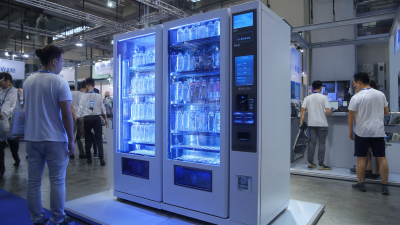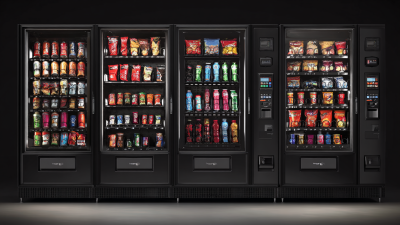Exploring the Rise of Water Vending Machines and Their Impact on Sustainable Hydration Choices
In recent years, the emergence of water vending machines has dramatically transformed the way we access clean and affordable drinking water. As communities grapple with concerns about plastic waste and the environmental impact of bottled beverages, these innovative machines offer a sustainable alternative that encourages healthier hydration choices. Designed to dispense purified water at a fraction of the cost of bottled drinks, water vending machines not only provide convenience but also promote eco-friendly habits by reducing reliance on single-use plastics.
This exploration delves into the rise of water vending machines and examines their significant influence on consumer behavior, public health, and environmental sustainability. By making hydration accessible and affordable, these machines are pivotal in addressing the global water crisis while fostering a culture of mindful consumption. As urban areas increasingly adopt this technology, it is essential to understand how water vending machines can reshape our daily routines and contribute to a more sustainable future. Through this overview, we will unveil the potential benefits of water vending machines, spotlight successful case studies, and offer insights into how individuals and communities can integrate this resource into their hydration habits.

Understanding the Concept of Water Vending Machines in Today's Market
Water vending machines have emerged as an innovative solution in today's market, addressing the growing demand for convenient and sustainable hydration options. These machines, which dispense purified water for a nominal fee, are becoming increasingly common in urban areas, parks, and public spaces. Unlike traditional bottled water, these systems encourage consumers to bring their own reusable containers, significantly reducing plastic waste. By offering a sustainable alternative to single-use plastics, water vending machines promote environmentally responsible choices.
Furthermore, the technology behind these machines ensures high-quality water, often filtered and treated to meet health standards. Many units feature touchless operations and refill notifications, enhancing user experience and encouraging repeated use. As awareness of environmental issues rises, more consumers are turning to these machines, not just for convenience but as part of a broader shift toward sustainable practices. This trend highlights the importance of providing accessible hydration solutions that align with an eco-conscious lifestyle, making water vending machines a pivotal player in the future of beverage distribution.
Impact of Water Vending Machines on Sustainable Hydration Choices
This chart illustrates the increasing number of water vending machines from 2018 to 2022, highlighting the growing trend towards sustainable hydration options in the market.
Identifying Sustainable Benefits of Using Water Vending Machines
Water vending machines are emerging as a pivotal solution in promoting sustainable hydration choices, particularly as cities like Chennai prepare to roll out numerous units to enhance access to clean drinking water. These machines not only provide an affordable alternative to bottled water but also significantly reduce plastic waste—a concern that resonates with the growing eco-consciousness among consumers. According to industry reports, the global market for water vending machines is projected to grow by over 10% annually, driven largely by urbanization and the increasing demand for convenient hydration options.
Moreover, the sustainability benefits of water vending machines extend beyond reducing plastic usage. Each machine promotes local water sourcing, thereby minimizing the carbon footprint associated with transporting bottled water. Additionally, the integration of smart technology in these units has the potential to enhance user engagement in sustainable practices, echoing trends seen in reverse vending machines that gamify recycling efforts. This type of innovation aligns with recent findings that indicate a strong willingness among Millennials to support brands that prioritize environmental responsibility. As communities continue to adopt water vending solutions, the potential for broader societal impacts on hydration habits and environmental health becomes increasingly promising.
Exploring the Rise of Water Vending Machines and Their Impact on Sustainable Hydration Choices - Identifying Sustainable Benefits of Using Water Vending Machines
| Feature | Value |
|---|---|
| Average Cost per Liter | $0.25 |
| Annual Reduction in Plastic Waste (in kg) | 2500 |
| Liters of Water Dispensed per Day | 2000 |
| Average User Savings per Year | $300 |
| Percentage of Users Choosing Reusable Containers | 80% |
| Estimated CO2 Reduction (metric tons/year) | 15 |
How to Choose the Right Water Vending Machine for Your Needs
When selecting the right water vending machine for your needs, several factors should be considered to ensure it meets your specific requirements while promoting sustainable hydration choices. Firstly, evaluate the machine's filtration and purification processes. Machines equipped with advanced filtration systems, such as reverse osmosis or UV purification, guarantee that the water you dispense is clean and safe, adding to your peace of mind.
Next, consider the location and accessibility of the machine. A well-placed vending machine that caters to high foot traffic areas can enhance convenience and encourage more individuals to choose refill options over single-use plastic bottles. Look for features such as touchless dispensing, multiple sizes for fill-ups, and payment options, which can significantly improve user experience. Additionally, assessing the machine's environmental impact, such as its energy efficiency and use of eco-friendly materials, will help you make a more informed decision that aligns with sustainable practices in water consumption.

Examining Health and Safety Standards for Water Vending Machines
The rise of water vending machines has transformed the way people access hydration, particularly in urban settings like Bangkok, where convenience often trumps regulatory compliance. Alarmingly, over 90% of inspected coin-operated water vending machines in Bangkok were found to operate without the necessary legal licenses. This raises critical health and safety concerns about the water consumers are actually receiving, as the lack of oversight can lead to inadequate filtration and treatment of the water, undermining its safety for drinking.
To ensure the quality and safety of water dispensed, adherence to strict health and safety standards is essential. Organizations such as the Water Dispenser & Hydration Association emphasize the importance of high hygiene standards in the industry. With the increasing demand for accessible clean water, it's crucial that both consumers and regulators are vigilant in understanding the operational standards of these machines. Only through rigorous enforcement of safety regulations can we ensure that water vending machines contribute positively to public health and promote sustainable hydration choices.
Promoting Community Awareness and Acceptance of Water Vending Initiatives
The rise of water vending machines presents a unique opportunity to promote sustainable hydration choices within communities. By providing easy access to clean and affordable drinking water, these machines encourage individuals to choose refillable water bottles over single-use plastics. This shift not only benefits the environment but also fosters a culture of sustainability, where residents feel empowered to make responsible choices regarding their water consumption.

To enhance community awareness and acceptance of water vending initiatives, targeted educational campaigns are essential. Local governments and organizations can collaborate to host workshops and information sessions that highlight the benefits of water vending machines—emphasizing their role in reducing plastic waste, conserving resources, and ensuring access to safe drinking water for all. Engaging community members in discussions about their hydration habits and inviting feedback can help tailor these initiatives to meet local needs, ultimately leading to greater community buy-in and participation in sustainable hydration practices.
Related Posts
-

Revolutionizing Vending Machines in 2025 The Ultimate Guide to Innovative Free Solutions for Global Buyers
-

Exploring the Future of Water Vending Machines at the 138th Canton Fair 2025 in China
-

Top Strategies for Sourcing the Best Refrigerated Vending Machine Solutions
-

Discovering the Ultimate Convenience: What Makes the Best Coffee Vending Machine Stand Out?
-

Elevate Your Business with the Finest Vending Machines from Premier Chinese Manufacturers
-

Innovative Solutions for Snack Dispenser Machine Efficiency
